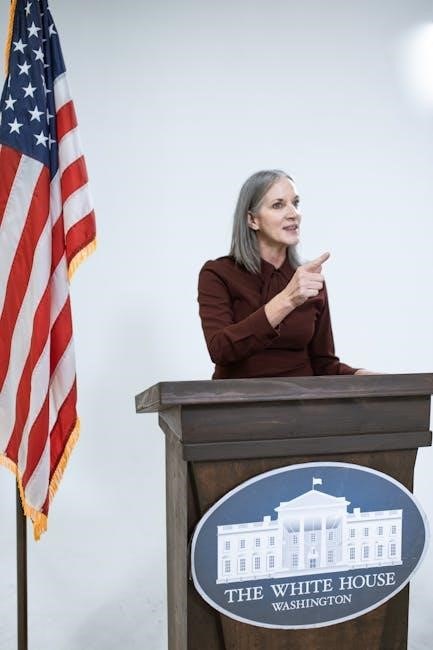Max Weber’s Politics as a Vocation is a seminal work exploring the nature of political engagement, leadership, and the qualities required for a life in politics.
1.1 Definition and Context of the Essay
Max Weber’s essay Politics as a Vocation defines politics as a vocation requiring passion, perspective, and a commitment to the public good. Delivered in 1919, it critiques bureaucracy and political structures, emphasizing ethical dilemmas and leadership challenges. The essay is part of Weber’s broader sociological works, offering insights into the complexities of political life and the qualities needed for effective governance. Its relevance extends to contemporary debates on political engagement and the role of individuals in shaping societal change.
1.2 Historical Background and Relevance
Written in 1919, Weber’s lecture Politics as a Vocation emerged amid Germany’s post-World War I turmoil, addressing the political instability and societal shifts of the time. Weber critiqued the rise of bureaucracy and the challenges of leadership in a fragmented political landscape. The essay remains relevant today, offering insights into the complexities of political engagement, ethical decision-making, and the role of individuals in shaping governance. Its historical context underscores Weber’s concern for democratic governance and the enduring tension between power and morality in politics.

Key Concepts in “Politics as a Vocation”
Weber explores the state’s monopoly on violence, legitimacy, and authority, emphasizing politics as a means to power and governance, shaped by ethical and structural dynamics.
2.1 The State and Its Monopoly on Legitimate Violence
Max Weber defines the state as an entity claiming a monopoly on legitimate violence within a defined territory. This concept underscores the state’s authority to enforce order and protect its citizens, distinguishing it from other social institutions. Weber argues that legitimacy arises from legal, traditional, or charismatic sources, ensuring compliance. The state’s control over violence is central to its governance, enabling it to maintain sovereignty and enforce laws. This idea remains foundational in understanding modern governance and the role of political authority. Weber’s analysis highlights the interplay between power, legitimacy, and the state’s function in society.
2.2 The Three Types of Legitimate Rule
Max Weber identifies three types of legitimate authority: traditional, charismatic, and legal-rational. Traditional rule relies on established customs and hereditary succession, often seen in monarchies. Charismatic authority stems from extraordinary personal qualities, inspiring loyalty and devotion. Legal-rational authority, most common in modern states, is based on impersonal rules and bureaucratic systems. Weber’s typology provides a framework for understanding how power is legitimized and exercised in different societies, emphasizing the interplay between leadership, norms, and institutional structures. This classification remains central to sociopolitical analysis, offering insights into the evolution of governance and authority.

The Vocation of Politics
Politics as a vocation demands dedication, passion, and a deep sense of ethical commitment, as explored in Weber’s analysis of the political life’s unique demands.
3.1 The Dedication Required for Political Life
Max Weber emphasizes that political life requires unwavering dedication, as it demands personal sacrifices and a commitment to the public good above individual interests. Politicians must possess resilience, as they navigate complex ethical dilemmas and confront harsh realities. Weber highlights the importance of passion combined with a clear perspective, ensuring that political actions are guided by both emotion and rationality. This dedication is not merely a profession but a profound calling, as outlined in his seminal work Politics as a Vocation (Gerth and Mills, 1946).
3.2 The Role of Passion in Politics
Weber underscores passion as a critical driver in political life, essential for inspiring and motivating both leaders and followers. Passion fuels commitment to a cause, enabling politicians to overcome challenges and advocate for their vision. However, Weber cautions against unbridled emotion, stressing the need to balance passion with a clear perspective. This equilibrium prevents political action from becoming reckless or destructive, ensuring that passion serves as a constructive force in the pursuit of the common good, as detailed in his essay Politics as a Vocation (Weber, 1919).
3.3 The Concept of “Calling” in Politics
Weber introduces the concept of “calling” to describe a profound sense of duty and purpose in political engagement. He argues that true political leaders are driven by a deep commitment to serve the public good, viewing their work as a moral vocation rather than a mere profession. This calling demands personal sacrifice, ethical integrity, and a long-term perspective, distinguishing it from opportunistic or self-serving political behavior, as explored in Politics as a Vocation (Weber, 1919).

The Feasibility of Politics as a Vocation
Weber examines the practical challenges of pursuing politics as a sustainable career, emphasizing the need for passion, perspective, and ethical resolve in navigating its complexities.
4.1 Economic Independence and Political Engagement
Max Weber argues that economic independence is crucial for political engagement, as it allows individuals to pursue their convictions without being swayed by material interests. He emphasizes that political leaders must have the financial stability to dedicate themselves fully to their vocation, ensuring their actions are guided by ethical principles rather than personal gain. This independence fosters autonomy and integrity, enabling politicians to make decisions that align with the public good rather than self-serving motives. Weber’s insights highlight the importance of financial freedom in maintaining the integrity of political leadership.
4.2 The Role of Political Parties
Max Weber discusses the pivotal role of political parties in shaping modern governance. He highlights how parties organize political life, recruit leaders, and articulate policies. Weber argues that parties are essential for mobilizing support and structuring decision-making processes. However, he also critiques the potential for bureaucratic rigidification within parties, which can stifle innovation and genuine political engagement. Weber emphasizes the tension between party loyalty and individual conviction, underscoring the need for parties to balance organizational discipline with flexibility to adapt to changing societal needs and maintain democratic accountability.
Ethics in Politics
Weber explores the ethical complexities of political life, emphasizing the tension between conviction and responsibility. He discusses the moral dilemmas inherent in wielding power and making decisions that impact society.
5.1 The Dilemma of Conviction and Responsibility
In “Politics as a Vocation,” Weber examines the ethical conflict between adhering to personal convictions and fulfilling political responsibilities. Leaders often face situations where their beliefs may clash with practical realities, forcing them to make difficult choices. Weber argues that effective politicians must balance their ideals with the necessity of achieving tangible results, even if it means compromising on certain principles; This dilemma underscores the moral complexity of political decision-making.
5.2 The Problem of Dirty Hands in Politics
Weber discusses the moral challenge of “dirty hands” in politics, where leaders must sometimes engage in unethical actions to achieve greater good. This concept highlights the tension between maintaining moral integrity and the pragmatic demands of governance. Weber argues that true political leadership requires the willingness to make tough, often morally compromising decisions to serve the public interest. This idea remains central to contemporary debates about the ethics of political action and the nature of leadership.
The Ideal Politician
The ideal politician, as per Weber, combines passion for a cause with a cool sense of perspective, balancing emotions with rationality to serve the public interest effectively.
6.1 Personality Traits of Effective Leaders
Max Weber’s “Politics as a Vocation” emphasizes that effective political leaders must possess a combination of passion and perspective. Passion drives their commitment to a cause, while perspective ensures they maintain clarity and ethical judgment. Leaders must be dedicated, resilient, and guided by a strong sense of responsibility. Weber argues that these traits are essential for navigating the complexities of political life, balancing emotion with rationality, and upholding the public interest amidst challenging circumstances.
6.2 The Balance Between Passion and Perspective
In “Politics as a Vocation,” Max Weber highlights the necessity of balancing passion and perspective in political leadership. Passion fuels commitment to a cause, while perspective ensures decisions are guided by rationality and ethical consideration. Without passion, leaders risk detachment; without perspective, they may succumb to blind ideology. Weber argues that this balance is crucial for navigating the moral dilemmas and complexities of politics, enabling leaders to act with conviction while maintaining a clear-eyed view of consequences and responsibilities.

The Sociology of Politics
Max Weber’s analysis of politics examines bureaucracy’s impact on governance and the civil service’s role in shaping modern political systems and administrative structures.
7.1 Bureaucracy and Its Impact on Governance
In Politics as a Vocation, Weber examines bureaucracy as a dominant form of governance, emphasizing its efficiency and rational organization. He highlights how bureaucratic structures, characterized by hierarchy, specialization, and rule-bound procedures, provide stability but can also lead to rigidity. Weber warns that unchecked bureaucracy may suppress individual creativity and adaptability, potentially hindering effective governance. His analysis remains relevant in understanding modern administrative systems and the challenges they face in balancing efficiency with innovation.
7.2 The Role of the Civil Service
In Politics as a Vocation, Weber underscores the civil service as a cornerstone of modern governance, emphasizing its role in implementing policies effectively. He highlights the importance of civil servants’ expertise, neutrality, and commitment to public service. Weber argues that civil service should operate based on technical knowledge and impersonal execution of tasks, ensuring continuity and stability in governance. This institution, he contends, bridges the gap between political leadership and administrative execution, playing a crucial role in maintaining order and efficiency in the state apparatus.

The Historical Context of the Essay
Politics as a Vocation was written in 1919, a time of political upheaval in Germany post-World War I, shaping Weber’s analysis of governance and leadership challenges.
8.1 The Timing of Weber’s Lecture
Max Weber delivered Politics as a Vocation in 1919, amidst Germany’s post-World War I turmoil. This period of political instability and transition from monarchy to democracy heavily influenced his reflections on leadership, authority, and the role of the state. The lecture, part of a series on academic and political vocations, captured the zeitgeist of a nation grappling with reconstruction and the rise of new political ideologies. Weber’s timing underscored the urgency of redefining political engagement in a fractured societal landscape.
8.2 The Influence of World War I and Its Aftermath
World War I profoundly shaped Weber’s perspective in Politics as a Vocation. The war’s devastation and the subsequent Treaty of Versailles led to widespread disillusionment and political upheaval in Germany. Weber observed the rise of radical ideologies, economic instability, and the collapse of traditional authority structures. These events influenced his analysis of the state’s role, the ethics of political leadership, and the challenges of rebuilding society. The aftermath of the war underscored the complexities of modern governance, forming the backdrop for Weber’s critical reflections on political vocation and responsibility.
Intellectual Legacy of “Politics as a Vocation”
Weber’s essay remains a cornerstone of political theory, influencing modern thinkers and continuing to shape discussions on leadership, ethics, and governance in contemporary contexts.
9.1 Influence on Modern Political Theory
Max Weber’s Politics as a Vocation has profoundly influenced modern political theory, shaping discussions on leadership, authority, and governance. Its exploration of the state’s role and legitimate violence remains central to contemporary debates. The essay’s themes of ethical responsibility and the ideal politician continue to inspire political thinkers, offering insights into the complexities of power and decision-making. Its integration into academic curricula and scholarly discussions underscores its enduring relevance, making it a foundational text for understanding modern governance and political leadership.
9.2 Critiques and Interpretations
Max Weber’s Politics as a Vocation has sparked significant debate, with scholars offering diverse interpretations. Some praise its nuanced analysis of political leadership, while others critique its perceived glorification of state power. Critics argue Weber’s emphasis on bureaucracy and charismatic authority may oversimplify complexities of governance. Interpretations vary, ranging from views of Weber as a realist to accusations of undermining democratic ideals. Mario and Dahrendorff, among others, have critiqued Weber’s stance on bureaucracy and its implications for modern governance, highlighting the essay’s enduring yet contentious influence.
Relevance in the Modern Era
Max Weber’s insights on power dynamics, bureaucracy, and leadership remain highly relevant, offering timeless perspectives on contemporary political challenges and ethical dilemmas in governance.
10.1 Applying Weber’s Ideas to Contemporary Politics
- Max Weber’s concepts of bureaucracy and authority remain crucial in analyzing modern governance structures and administrative systems.
- His emphasis on the role of charismatic leadership versus bureaucratic rule offers insights into contemporary political dynamics.
- The tension between technical expertise and democratic accountability, as Weber noted, continues to shape debates on governance.
- His ideas on the ethical dilemmas of political power resonate with current discussions on leadership and accountability.
- Weber’s framework for understanding political legitimacy is invaluable in addressing challenges like populism and institutional trust.
10.2 The Enduring Importance of the Essay
Max Weber’s Politics as a Vocation remains a foundational text in political theory, offering timeless insights into the complexities of governance and leadership. Its exploration of bureaucracy, authority, and the ethical dilemmas of power continues to influence contemporary debates. Weber’s analysis of legitimate rule and the role of passion in politics provides a framework for understanding modern political dynamics. The essay’s relevance endures as it addresses universal challenges, making it essential reading for scholars and practitioners seeking to navigate the intricacies of political life in any era.
